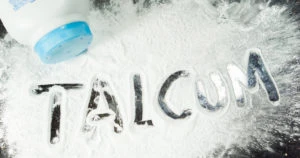
Plaintiffs in lawsuits against talc product manufacturers allege that the harmful ingredient in talcum powder is one that is already known to cause cancer: asbestos.
When mining talc, it is easy to allow the mineral to become contaminated with asbestos, because these minerals often occur naturally nearby. Unless the mines take careful steps to avoid this, and the product manufacturers are careful about the raw talc they use, talcum powder products can become contaminated with asbestos.
Health Risks Linked to Talcum Powder
A number of women believe their cancer is linked to talc powder use—more than 18,000 as of July 2020. This seems to demonstrate, at least anecdotally, that manufacturers are not taking the necessary steps, despite touting their products as being safe for personal hygiene use.
In addition to asbestos, raw talc could contain asbestiform fibers and arsenic, both of which can cause medical problems. The most serious health concerns linked to the use of talcum powder include:
- Mesothelioma, as detailed in a 2020 study published in the Journal of Occupational and Environmental Medicine.
- Ovarian cancer, as confirmed in a 2018 report in Epidemiology that found a “consistent association.”
The Link Between Talc and Asbestos Is Recent
The first talcum powder lawsuit that went before a jury in federal court concluded in 2013, before there was a known link between talc and asbestos. According to the Rapid City Journal, the federal jury in Sioux Falls heard expert testimony that the cancerous tissue removed from the plaintiff’s ovaries contained talc particles. These were seen and identified using an electron microscope.
The jury ruled in favor of the plaintiff, saying they believed there was a link between her ovarian cancer and three decades of using Johnson & Johnson’s Shower to Shower body powder. They recommended that Johnson & Johnson warn women against using their talc-based products for feminine hygiene.
Five years passed between this ruling and when the general public learned that powder manufacturers might have been aware that their products contained asbestos. The cases in the ongoing multidistrict lawsuit, MDL-2738, will likely involve arguments on both sides debating asbestos contamination of talc. As of August 2020, this case is being heard in the U.S. District Court of New Jersey.
A News Report Uncovered Evidence That the Manufacturers Knew of Possible Contamination
While there were theories about asbestos, it was not clear what the harmful ingredient In talcum powder might be until an investigative report from the news agency Reuters exposed what might be one of the biggest defective product coverups ever.
In this report, Reuters alleged that Johnson & Johnson and other talcum powder manufacturers and participants in the talc supply chain knew that their talc was contaminated yet continued to sell their products with no warnings to consumers for decades. The contaminant was the known carcinogen asbestos. Inhaling asbestos fibers is known to cause mesothelioma and lung cancer, as well as numerous other health concerns.
Reuters claimed its reporters uncovered internal documents to show that powder manufacturers tested their raw talc and products for asbestos, indicating awareness of contamination.
As of August 2020, Johnson & Johnson has not admitted there were any problems with their talc-based products. They continue to claim they were safe and continue to be safe. Johnson & Johnson began a phase-out of their talc-based powder products in May of 2020. They point to a decrease in consumer demand for the change. They have marketed their popular Johnson’s Baby Powder with a talc-free formula since the 1980s, and this corn-starch-based product will remain on the market.
Speak With a Member of Our Team About Your Case
If you used talc-based powder products for feminine hygiene or cosmetic uses and later received a diagnosis of ovarian cancer or mesothelioma, you likely qualify to file a lawsuit and possibly join MDL-2738. This will allow you to pursue compensation and hold the powder manufacturer, mining company, and others responsible.
At Friedman & Simon, L.L.P., our mass tort team members are passionate advocates for the injured. This includes those who suffered injuries because of a dangerous or defective product and the manufacturer’s coverup of those dangers.
We have staff who can discuss your options with you in English, Spanish, Greek, Bengali, Tamil, or Kannada. Reach out to us today to discuss your next steps. There are time limits in these cases, so it is important that we go to work right away.
Call Friedman & Simon, L.L.P. today at (516) 932-0400. Our case consultations and reviews are always free.